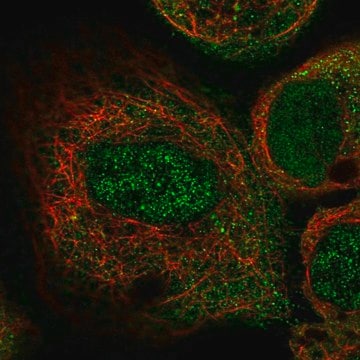MABT162
Anti-Pinch-1 Antibody, clone 9D2.1
clone 9D2.1, from mouse
Synonym(s):
LIM and senescent cell antigen-like-containing domain protein 1, Particularly interesting new Cys-His protein 1, PINCH-1, Renal carcinoma antigen NY-REN-48
About This Item
Recommended Products
biological source
mouse
Quality Level
antibody form
purified immunoglobulin
antibody product type
primary antibodies
clone
9D2.1, monoclonal
species reactivity
human, mouse
technique(s)
immunohistochemistry: suitable
western blot: suitable
isotype
IgMκ
NCBI accession no.
UniProt accession no.
shipped in
wet ice
target post-translational modification
unmodified
Gene Information
human ... LIMS1(3987)
General description
Immunogen
Application
Cell Structure
Adhesion (CAMs)
Quality
Western Blotting Analysis: 0.5 µg/mL of this antibody detected Pinch-1 in 10 µg of human heart tissue lysate.
Target description
Physical form
Storage and Stability
Analysis Note
Human heart tissue lysate
Other Notes
Disclaimer
Not finding the right product?
Try our Product Selector Tool.
Storage Class Code
10 - Combustible liquids
WGK
WGK 2
Flash Point(F)
Not applicable
Flash Point(C)
Not applicable
Regulatory Listings
Regulatory Listings are mainly provided for chemical products. Only limited information can be provided here for non-chemical products. No entry means none of the components are listed. It is the user’s obligation to ensure the safe and legal use of the product.
JAN Code
MABT162:
Certificates of Analysis (COA)
Search for Certificates of Analysis (COA) by entering the products Lot/Batch Number. Lot and Batch Numbers can be found on a product’s label following the words ‘Lot’ or ‘Batch’.
Already Own This Product?
Find documentation for the products that you have recently purchased in the Document Library.
Our team of scientists has experience in all areas of research including Life Science, Material Science, Chemical Synthesis, Chromatography, Analytical and many others.
Contact Technical Service








